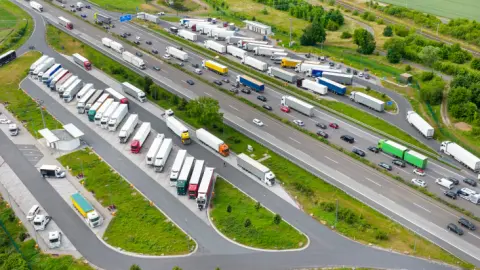European truck market: speed slows, CO2 focus intensifies
The European heavy truck market is slowing down after years of low production and a peak in 2023. We anticipate this decline will persist into 2025 before reaching a turning point. Meanwhile, CO2 regulations are compelling manufacturers to accelerate the adoption of electric trucks
The European truck market has gone through extraordinary times following years of supply-side challenges, but this has balanced out over the course of 2024. In this article, we’ll dive into the current state, market compositions, trends, regulations and the outlook for 2025.
Transport volume setback created spare capacity
Over the past decade, transport volume growth has outpaced fleet capacity as occupancy rates increased and the transport system became more efficient through optimised planning. Nevertheless, Europe’s truck fleet has steadily grown, adding more than 400,000 medium and heavy trucks to the EU-installed base (+7%) between 2019 and 2024.
Following a period of capacity shortage, haulage companies received equipment orders last year that were no longer immediately needed. Despite a freight volume correction of over 3% in 2023, the fleet likely continued to grow due to the remaining previously ordered new inflow and low remarketing values, creating excess capacity at the sector level.
Transport demand growth exceeded truck fleet expansion – but pressure on capacity has diminished
Development of truckpark vs. transport performance in ton/km (EU 27), index (2015 = 100)

Large carriers used the sluggish market to idle trucks and review their fleets
Large international carriers have reviewed their fleets in the declining market, idling or reducing capacity to adjust to market conditions. Initially, these vehicles often remain in Europe. However, fleet figures from the Netherlands show that trucks aged 10 years or older are increasingly being taken off the roads, likely due to higher operating costs and mileage charges. This may also include the fact that older internationally operated vehicles will be required to have a 'smart tachograph' by the end of 2024, which will cost between €1,000 and €1,500 to install.
Replacements haven't caught up yet after years of low inflow
% rolling stock replaced by new trucks per year in various European truck markets

Years of subdued capacity, new inflow and replacement offers underlying potential
Recent supply issues have impacted the European truck fleet. Pandemic and war-related disruptions hampered production, with brands like Scania and MAN temporarily suspending orders, delaying production cycles. Long lead times, high prices, and interest rates led fleet owners to postpone investments.
From 2020 to 2024, annual replacement rates in major markets like Germany, France, and the UK were 6-8%, about two percentage points lower than in previous years. Consequently, the average European truck became 1.5 years older after 2019, despite new models offering significant fuel efficiency gains. An older fleet results in increased downtime and costs.
Despite a rebound in deliveries in 2023, the gap remains, indicating pent-up demand and potential for truck manufacturers when the investment climate improves.
Delivery times normalised, backlogs cleared after extraordinary times
After a big jump in orders and delivery times extending beyond a year, the supply chain of truck manufacturers has largely normalised. Since the end of 2022, production has exceeded order inflow, and in 2023 and 2024, manufacturers delivered more trucks than they received in orders.
Truck manufacturers, including Daimler Trucks and Volvo, have mentioned that order books are in sync with production for 2024. ING Research calculations confirm that order book levels have roughly returned to pre-pandemic levels when production interruptions began.
Consequently, delivery times for regular trucks have now dropped to two to three months. However, delivery times for electric trucks remain longer as production scales up. Manufacturers are also eager to push the registration of electric vehicles into 2025 to meet the CO2 reduction target of -15%.
New order intake trucks in 2024 down 10-20%
New order intake and deliveries truck brands (Europe) 1-3Q 2024 YoY

As production has been scaled back now, the decline of order to manufacturing rates (‘book-to-bill ratio’) might hit the bottom in the run-up to 2025. This still means we will likely see declines in delivery volumes through 2025.
Truck deliveries exceed order intake for the third year in 2024
Book-to-bill ratio European truck manufacturers*

Correction of new truck deliveries to continue in 2025 before picking up
Slowing order intake indicates a retreat in investment appetite for new trucks. This became more pronounced in 2023. For example, Volvo Trucks' order intake decreased from the second quarter onwards compared to 2022, leading to significantly lower deliveries in the third quarter, a trend likely to continue into 2025.
Temporary 'kurzarbeit' at Daimler's Würth plant in mid-2024 and reduced production at DAF Eindhoven from 260 to 160 trucks per day by the end of 2024 signalled this deceleration. As we approach 2025, order intake is bottoming out, but delivery slowdowns will persist. We expect European new truck registrations to decrease to 390,000 in 2024 (-5%) and 365,000 in 2025 (-6%), close to the 10-year average.
European new truck deliveries in decline in 2024 and 2025
Registrations of new trucks > 3.5 tonnes EU + EFTA + UK

Weak German order intake is weighing on market performance in Europe, especially for heavily represented brands. German new order intake of Mercedes, for example, even halved in the third quarter compared to the previous year and the full market dropped by 35%.
Southern European truck markets beat the average
New truck registrations >3.5 tonne in European countries 1-3Q 2024

Prices of new trucks are dropping following relaxation of the market
Truck customers have regained bargaining power again. Consequently, sharper price negotiations have resumed, especially for fleet deals. Prices of new trucks are falling after a sharp increase, although this varies by brand. The days of paying €125,000 for a tractor during the height of scarcity and high raw material prices are over in fleet deals, but prices remain above €100,000.
Prices are unlikely to return to previous levels due to the pass-through of peak inflation of 15-20% in truck manufacturing costs. Additionally, significant investments in the development of zero-emission trucks, further reduction of lifecycle emissions (Euro VII*), and higher European safety requirements will result in permanently higher prices. For example, the introduction of new general safety regulations (11 safety systems) will make trucks approximately €2,000-4,000 more expensive from mid-2024.
Mercedes still leads the European truck market, Scania gains on strong deliveries after solid order intake
share of total new truck registrations > 6 tonnes in EU + EFTA + UK

DAF and Volvo gained market share in Europe, MAN’s stake under pressure
Market shares in the European truck market have remained relatively stable, with shifts mainly due to new model introductions. Supply chain issues also impacted market composition.
DAF maintained production well through 2022, and its new fuel-saving models (XF and XG) were well-received, though their impact lessened by 2024. Scania rebounded well due to pent-up demand, with strong order intake through the first quarter of 2024, leading to increased deliveries and market share in 2023.
Volvo's early advantage in e-trucks is fading as we approach 2025. MAN, significant in Germany, faced production interruptions in 2022 and had to suspend orders but partially recovered in 2024.
More attention to truck emissions report when consider ordering
With increasing attention on transport's CO2 footprint, there is also more interest in the so-called VECTO report that comes with the registration of a new truck. This contains vehicle emission details and this is also the basis for the mandatory CO2 reduction over the average production for manufacturers. With an eye on CO2-linked mileage charging (such as in Germany), transport companies can see in advance which emission class the truck will end up in and, if desired, make adjustments.
Second-hand market sees larger inventories and lower prices
Demand for used trucks is relatively responsive to changes in market conditions and has already fallen in anticipation of the new truck market in 2023. With the increased capacity in the road transport market, the stock of used equipment has grown, leading to a sharp drop in prices.
At the same time, sustainability is gaining a stronger foothold in the second-hand market, with increasing differences in supply and price between relatively new and older equipment. It appears that second-hand prices have bottomed out, although the market is not expected to pick up significantly in 2024.
Truck manufacturer update
Daimler Truck
In the third quarter of the year, Daimler Truck sold 114,917 vehicles, down 11% year-on-year, including 49,176 units in Trucks North America, up 4% YoY, 28,688 units in the Mercedes-Benz segment (-28% YoY), 32,245 units in Trucks Asia (-15% YoY) and 6,677 units of Daimler Buses (-2% YoY). During the first nine months of this year, Daimler Truck sold 336,023 vehicles, down 13% YoY.
In the third quarter of 2024, the truck manufacturer had revenues of €13.1bn, down 5% YoY, and EBIT of €873m, down 27% YoY. The company’s Trucks North America had a positive performance during the reported quarter, with revenue of €5,991m, up 5% YoY, and EBIT of €722m, up 2% YoY, while the Mercedes-Benz segment underperformed, with revenue of €4,398m, down 19% YoY, and EBIT of €80m, down sharply by 82% YoY. In 3Q24, the Trucks Asia segment had revenue of €1,483m, down 11%, and EBIT of €57mn, up 27% YoY, while the Daimler Buses had revenue of €1,234m, up 4%, and EBIT of €140m, up 100% YoY. In terms of operational factors impacting segmental performance, the Mercedes-Benz segment was clearly impacted by significantly lower vehicle sales volume, in particular, in the EU30 region.
In the current reporting year, Daimler Truck expects the global economy to slow slightly compared to the prior year, with the monetary policy environment remaining restrictive and impacting consumer demand and capital investments. After the third-quarter release, the company maintained its unchanged outlook for FY24, with unit sales of 460,000 to 480,000 vehicles, revenue of €53bn to €55bn and reported EBIT significantly and adjusted EBIT slightly below the prior-year level.
Volvo Group
In 3Q24, Volvo Group had net sales of SEK117.0bn, down 12% YoY (-7% YoY when adjusted for currency movements), and adjusted operating income of SEK14.1bn, down 27% YoY, with the respective margin of 12.0%, down from 14.4% in 3Q23. In the reported quarter, the company had deliveries of 46,266 trucks, down 16% YoY, and deliveries of 11,703 units of construction equipment, down 12% YoY. The truck delivery declines were caused in part by the light-duty vehicle change-over in Europe, which commenced this past strong while heavy-duty truck deliveries were down 9% YoY from the very strong comparative base of the prior year.
According to the company, in 3Q24, demand continued to normalise in the majority of Volvo Group’s markets, with freight and construction activity down in many regions across the world relative to the very high levels of the prior year. The company also noted that in 3Q24 order intake for heavy-duty trucks declined by 7% YoY, due to a cautious customer approach towards ordering for 2025 given macroeconomic uncertainties.
Volvo Group adds that with the adjusted production programmes during the first half of this year, the European production volumes are more balanced relative to the current market demand with a positive book-to-bill ratio for the heavy-duty trucks in the third quarter of this year. In North America, the company also adjusted its production volumes to reduce inventories while also commencing the production of the new Volvo VNL range. The company also indicated that demand for buses remained resilient, in particular, for coaches.
In 3Q24, the European truck market continued to decline from the high comparative base of 2023, with freight volumes and freight rates also down from the recent peaks, and the underlying demand is primarily underpinned by the replacement activity. The North American market is driven more by the vocational market segment, whereas demand for on-highway trucks is weaker. The company notes that in North America many retail customers are in a wait-and-see mode, waiting for more clarity on the outlook for the freight market. In India, the truck market was rebounding after the general elections while being also adversely affected by the longer monsoon period, which affected mining and infrastructure projects. There was a high degree of competition in the Chinese freight market, with overcapacity in the transportation sector, high dealer inventories and pricing pressures for diesel-run trucks.
For FY24, Volvo Group sees Europe’s heavy-duty truck market at 300,000, the North American heavy-duty truck market at 290,000 units, the China medium and heavy-duty truck market at 750,000 units, Indian medium and heavy-duty truck market at 370,000 and the Brazilian one at 100,000.
Paccar
In 3Q24, Paccar had net sales and revenues from Trucks, Parts and Other of $7.7bn, down 6% YoY, and respective income before income taxes of $1.0bn, down 24% YoY. Overall, with the Financial Services, the company had sales and revenues of $8.2bn, down 5% YoY, and pre-tax profit of $1.3bn, down 21% YoY. In terms of regional sales, in 3Q24, Europe’s sales were down 20% YoY, and sales in the United States and Canada were down 5% YoY.
In the reported quarter, Paccar had net truck deliveries of 44,900, down 10% YoY, including 25,900 in the United States and Canada, down 6% YoY, 10,000 in Europe, down 31% YoY, and other regional deliveries of 9,000, up 11% YoY. In the first nine months of 2024, the company had net truck deliveries of 141,000, down 8% YoY, with deliveries down in Europe by 31% YoY, up in the United States & Canada by 4% YoY and up in the Other markets by 2% YoY.
Traton
In 3Q24, Traton Operations had sales revenue of €11.9bn, up 5% YoY, and adjusted operating results of €1.2bn, up 21% YoY, with the respective margin of 10.7%, up from 9.2% in 3Q23. In the reported quarter, the company had unit sales of 85,274, up 5% YoY, and incoming orders of 64,353, flat year-on-year. In the reported quarter, Europe was affected by weaker truck demand and unit sales, in particular, in Germany. In the US, demand for medium and heavy trucks remained robust while there was a weaker demand for Class 8 on-highway trucks. Furthermore, there were strong truck sales due to a favourable market environment in South America, in particular Brazil. In 3Q24, sales also benefited from catch-up sales after the prior mirror supply issue.
In the first nine months of 2024, Traton Operations had sales revenue of €34.3bn, up 3% YoY, and adjusted operating result of €3.6bn, up 15% YoY, with a respective margin of 10.4%.
Thanks to:
Europe:
Mark Mulder (Girteka), Marek Zdanowicz (Raben Logistics), Eric Muller (GoodYear), Matthijs Reinders, Anatol Holland (Daimler Trucks), Pauli Johannesen (PNO Rental) and others.
Netherlands:
Peter Leegstraten (Cornelissen), Thomas Fabian (ACEA), Ruud van Outersterp (Bas Trucks), Diederik Boon van Ostade (Bas World), Arjan Velthoven (TTM), Hans Everts and Frank Ruygrok (Bovag), Niels van der Aa (Daimler trucks NL), Paul Broos, Jeroen Janssen (ElaadNL), Dennis Steeghs (Ewals Cargo), Dolf Lutterman (Iveco Schouten), Niels van Kooten (Kleyn Trucks), André Menzing (Krone), Marcel Vermeulen (Millenaar and Van Schaik) Jacobjan Vermeiden, Chris Buijtenhuis (MAN Trucks), Gert-Jan Meijerink, Wijnand Derkman (Nijhof-Wassink Group), Jeroen Vaessen (Nijwa zero), Sacha Boedijn, Tom van Steijn (RAI Vereniging), Jan de Vries (Scania), Eric Visser, Diederick van Haselen, Peter Jan Troost (TIP trailers), Ambro Smit (TLN), George Seitzinger (Volvo van Dijk), Jules Menheere (Vos Deventer), Ben Vos, Pieter Derksen (Vos Logistics), Rogier Verkley (Wezenberg), Pieter-Bas Broshuis (Broshuis trailers), Ewout van Wijk (E. van Wijk logistics), Willem Feenstra (Heiwo),
This publication has been prepared by ING solely for information purposes irrespective of a particular user's means, financial situation or investment objectives. The information does not constitute investment recommendation, and nor is it investment, legal or tax advice or an offer or solicitation to purchase or sell any financial instrument. Read more
Download
Download article
12 December 2024
Truck and trailer market outlook 2025: navigating a greener future after extraordinary times This bundle contains 5 Articles
